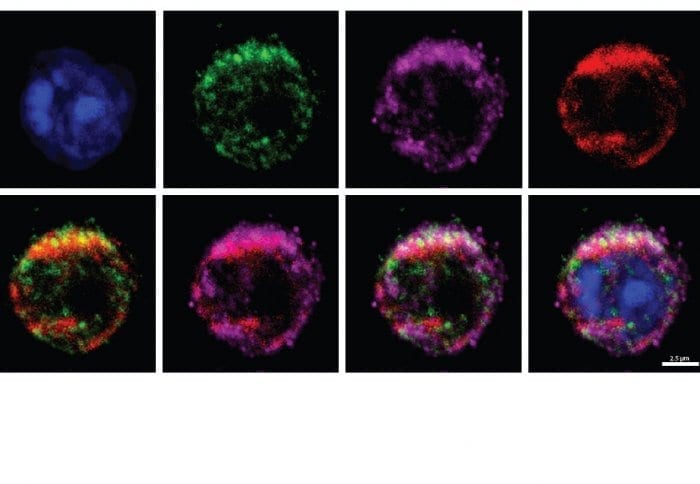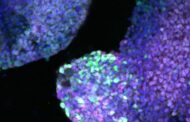Scientists have discovered a protein that plays a central role in promoting immunity to viruses and cancer, opening the door to new therapies.
Experiments in mice and human cells have shown that the protein promotes the proliferation of cytotoxic T cells, which kill cancer cells and cells infected with viruses. The discovery was unexpected because the new protein had no known function and doesn’t resemble any other protein.
Researchers from Imperial College London who led the study are now developing a gene therapy designed to boost the infection-fighting cells, and hope to begin human trials in three years.
The study also involved researchers at Queen Mary University of London, ETH Zurich and Harvard Medical School. Their discovery, which has been six years in the making, is reported today in the journal Science.
Cytotoxic T cells are an important component of the immune system, but when faced with serious infections or advanced cancer, they are often unable to proliferate in large enough quantities to fight the disease.
By screening mice with genetic mutations, the Imperial team discovered a strain of mice that produced 10 times as many cytotoxic T cells when infected with a virus compared with normal mice. These mice suppressed the infection more effectively, and were more resistant to cancer. They also produced more of a second type of T cells, memory cells, enabling them to recognise infections they have encountered previously and launch a rapid response.
The mice with enhanced immunity produced high levels of a hitherto unknown protein, which the researchers named lymphocyte expansion molecule, or LEM. They went on to show that LEM modulates the proliferation of human T cells as well as in mice.
The researchers now aim to develop a gene therapy designed to improve immunity by boosting the production of LEM. With the support of Imperial Innovations, the technology commercialisation company for the College, the researchers have filed two patents. A company called ImmunarT has been formed with the aim of commercialising the technology.
Professor Philip Ashton-Rickardt from the Section of Immunobiology in the Department of Medicine at Imperial, who led the study, said: “Cancer cells have ways to suppress T cell activity, helping them to escape the immune system. Genetically engineering T cells to augment their ability to fight cancer has been a goal for some time and techniques for modifying them already exist. By introducing an active version of the LEM gene into the T cells of cancer patients, we hope we can provide a robust treatment for patients.
“Next we will test the therapy in mice, make sure it is safe and see if it can be combined with other therapies. If all goes well, we hope to be ready to carry out human trials in about three years.”
Read more: Scientists discover protein that boosts immunity to viruses and cancer
The Latest on: Cytotoxic T cell
[google_news title=”” keyword=”Cytotoxic T cell” num_posts=”10″ blurb_length=”0″ show_thumb=”left”]
via Google News
The Latest on: Cytotoxic T cell
- Tevogen Bio CEO Highlights Expected Reporting of a $94.9 Million Liability Elimination, AI Initiative, and Leadership Appointmentson April 26, 2024 at 6:23 am
Conversion of promissory notes into common stock removed $94.9 million in pro forma balance sheet liabilities.The converted common stock is included in the company’s total 165 million outstanding ...
- Ludwig Lausanne scientists identify and show how to target a key tumor defense against immune attackon April 24, 2024 at 10:00 am
A Ludwig Cancer Research study has discovered how a lipid molecule found at high levels within tumors undermines the anti-cancer immune response and compromises a recently approved immunotherapy known ...
- Newly discovered mechanism helps tumor cells evade the immune system early onon April 24, 2024 at 8:00 am
Tumors actively prevent the formation of immune responses by cytotoxic T cells, which are essential in combating cancer. Researchers at the Technical University of Munich (TUM) and the ...
- Immutep Announces Positive Preliminary Topline Results from TACTI-003 Cohort Bon April 24, 2024 at 6:49 am
Media ReleaseData from efti in combination with KEYTRUDA® in first line head and neck squamous cell carcinoma patients who do not express PD-L1 ...
- RIPK3 inhibitor prevents lung damage in severe influenza infectionon April 23, 2024 at 5:00 pm
Remarkably, UH15-38 significantly improved survival outcomes even when given 5 days after infection. This contrasts with the current approved antiviral for influenza infection, oseltamivir, which ...
- Vaccines targeting chronic diseases show promise in combatting age-related conditionson April 17, 2024 at 3:32 am
Vaccines for age-related vascular diseases such as hypertension, abdominal aortic aneurysm (AAA), and atherosclerosis target molecules that regulate blood pressure, cholesterol, and blood vessel ...
- Exercise and the Immune System: What’s the Latest Research?on April 12, 2024 at 5:00 pm
Research suggests that with exercise, we have a natural way to improve immune health. Recent studies have advanced our understanding of the molecular processes that underpin exercise immunology.
- Study finds how novel immune cell therapy can fight hepatitis B infectionson April 10, 2024 at 3:57 pm
According to new research published in FEBS Letters, therapy that amplifies the impact of immune cells known as stem cell memory T cells (TSCMs) could be a promising technique for treating HBV.
- Could novel immune cell therapy combat hepatitis B infections?on April 10, 2024 at 12:10 am
Chronic infection with the hepatitis B virus (HBV) causes progressive liver problems, and eradication of the virus remains a formidable challenge.
- Novel mechanism supports antitumor response and T-cell survivalon April 9, 2024 at 12:00 pm
A recent Northwestern Medicine study has discovered a previously unknown molecular mechanism that supports antitumor responses and cell survival in cytotoxic immune cells, according to findings ...
via Bing News









1 Comments
Vadim Shapoval
Scientists, Proteins, Scientific Conspiracy Theories and Father of Oncology. Scientists have uncovered a protein that not only boosts immunity to cancer but also has the ability to fight viruses, an unexpected discovery because the protein previously had no known function and was unlike any other protein. Not all scientific conspiracy theories are wrong, the Father of Oncology explains. Conspiracy theories are immensely popular today. Conspiracy theories are easy to propagate and difficult to refute. Cancer is the name given to a collection of related diseases; cancer can start almost anywhere in the human body, which is made up of trillions of cells, the U.S. National Cancer Institute says. Cancer is a disease of iron-overloaded cells. Proteins are constructed from a set of 20 amino acids and have distinct three-dimensional shapes. At the cellular level, cancer occurs when cellular iron overload chaotically affects cellular molecules (proteins are large cellular molecules) and organelles, the Father of Oncology says. Primary tumors always develop at body sites of excessive iron deposits. Personalized clinical iron-deficiency methods can neutralize micrometastases. Surgery (ceramic blades) and direct intratumoral injections of iron-deficiency agents (ceramic needles) can eliminate tumors and metastases. Cancer costs the world economy nearly US$3 trillion every year. That is why scientific iron/cancer information-1905-2015 is largely ignored. One day, cancer will be chained to the iron chains, Vanga said. HIV is a priority for all health authorities in all countries over the world as one of the main dangers for individual’s health. HIV/AIDS affects every country in the world and in many infection rates are increasing rapidly. HIV drugs cost a lot of money. Today, an estimated 42 million people live with HIV/AIDS; the Father of Oncology lives without HIV/AIDS. Iron is essential for all pathogens. Viruses need iron for survival, growth and multiplication. Many macromolecules contain iron. When a virus particle is removed from its host it behaves like other macromolecules, such as hemoglobin. Viruses often express proteins that modify host-cell processes so as to maximize viral replication. A slow virus is a virus, etiologically associated with a disease, having a long incubation period of months to years. Iron-deficiency methods can affect the growth and multiplication of slow viruses. Personalized clinical iron-deficiency methods can neutralize HIV. Understanding how iron metabolism and viral infection interact might suggest new iron-deficiency methods to control HIV. Scientists can refute scientific conspiracy theories. http://www.medicalnewstoday.com/opinions/184574 ; https://plus.google.com/107119198688120551734/posts/QoZjZiTVAbD ; https://www.facebook.com/TheWarOnCancerFoundation/posts/658257930905936 ; https://www.facebook.com/MDLinx/posts/822589027777215 ; http://my.mail.ru/bk/vadim.shapoval/multipost/281A0000F1AF0003.html ; http://www.news-medical.net/opinion/becdf9c0-a088-47ad-ad0a-85aafa7b8f1d.aspx ; https://innovationtoronto.com/2015/04/scientists-discover-protein-that-boosts-immunity-to-viruses-and-cancer/ ; Vadim Shapoval